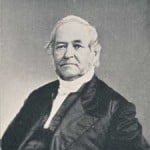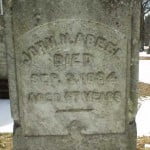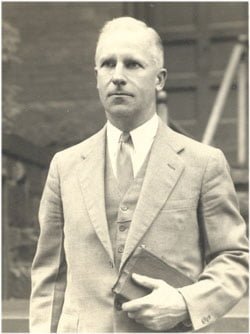Author of an Old Classic
Nathaniel Smyth McFetridge was born in Ireland, 4 August 1842. His parents immigrated to the United States while he was still a child and Nathaniel was raised in Catasauqua, Pennsylvania. His formal education began at Lafayette College in Easton, Pennsylvania. While attending there, he won the school’s Fowler Prize for an essay on Chaucer’s Canterbury Tales. McFetridge graduated from Lafayette in 1864, shortly before the inauguration of the Rev. William C. Cattell as president of Lafayette.
McFetridge began his studies for the ministry at Western Theological Seminary in Pittsburgh, where he studied under the renowned Archibald A. Hodge. McFetridge graduated from Western in 1867 and was ordained into the ministry by the Presbytery of Erie (PCUSA), being installed in 1868 as pastor of the First Presbyterian Church of Oil City, PA. That church had been organized in 1861 with twelve members and two ruling elders. His predecessor, the Rev. W.P. Moore, had served the Oil City congregation as stated supply since 1863.
Whatever the cause, a major loss of membership in the Oil City congregation—between 1865 in 1872 and dropping to the 151 members reported in 1873—may have been what prompted his relocation to the Wakefield Presbyterian Church of Germantown, PA in 1874. Transferring his credentials, Rev. McFetridge was received by the Presbytery of Philadelphia, North and served as the first pastor of the Wakefield congregation, from 1874 until 1885. It is interesting to note that the congregation began as the Wakefield Sunday-school, located in Fisher’s Hollow, PA. This Sunday-school was organized in 1856 by Quakers (Society of Friends, Orthodox), and was constituted in part by members of the Fisher family who had immigrated from Wakefield, England. Active participation in the school by Philadelphia-area Presbyterians eventually overtook the more subdued methods of the Quakers, and by 1873 the decision was made to establish a Presbyterian congregation. With the assistance of three other Presbyterian churches in Germantown, a site was secured and almost the entire membership of the School, faculty and students alike, joined in the organization of a new Wakefield Presbyterian Sunday-school. It was this group that then formed on 4 May 1874 the new congregation that occupied the chapel erected on Main Street below Fisher’s Lane. Under Rev. McFetridge’s leadership, the church grew from 22 members to over 200 members at the time of his departure.
It was also during the Wakefield pastorate that Rev. McFetridge delivered the six lectures from which he later gathered the text of Calvinism in History. Published in 1882, it predates Abraham Kuyper’s more widely known Stone Lectures for 1898, which were published under the title Lectures on Calvinism. It might be an interesting exercise to compare the two works, though at the start, Kuyper’s treatment is immediately seen as more scholarly and profound, whereas McFetridge aimed his work at the average person in the pew.
Rev. McFetridge was noted in the 1885 Minutes of General Assembly (PCUSA) as without charge, but the circumstances of his leaving the Wakefield church are now lost to history. By 1886 he had relocated to St. Paul, Minnesota, was received by the Presbytery of St. Paul, and is noted as laboring as a professor. He may also have been employed by Macalester College, which opened in 1885 with five professors on its staff. Rev. McFetridge was residing in St. Paul at the time of his death on 3 December 1886, at the age of 44.
Noted honors included the honorary Doctor of Divinity degree, and in 1878 he brought the Annual Sermon before the Brainerd Evangelical Society of Lafayette College. The Brainerd Society was named in honor of David Brainerd, and was Layfayette’s first student-led Christian organization. The Society was founded in 1833 and was in existence until 1956, making it the longest running student organization on that campus. The year before Rev. McFetridge spoke, the Brainerd Society had come into affiliation with the Young Men’s Christian Association. Other speakers before the Brainerd Society included Matthew Allison in 1854, James W. Dale in 1862 and Thomas Hasting Robinson in 1867.
The Minutes of the Wakefield Presbyterian Church of Germantown, PA are preserved at the Presbyterian Historical Society in Philadelphia, PA and these encompass the years of Rev. McFetridge’s pastorate, 1874-1885.
Words to Live By:
“There is nothing which so constantly controls the mind of a man, and so intensely affects his character, as the views which he entertains of the Deity. These take up their abode in the inmost sanctuary of the heart, and give tone to all its powers and coloring to all its actions. Whatever the forms and activities of the outward life, as a man “thinketh in his heart, so is he.” Men do, undoubtedly, liken God, in a measure, to themselves, and transfer to him somewhat of their own passions and predominating moral qualities, and determine the choice of their religion by the prevailing sentiments of their hearts and the habits in which they have been trained; but it is also true that their conceptions of God have a controlling influence in forming their character and regulating their conduct. The unfaithful servant in the parable of the Talents gave as the reason for his idleness his conception of the master as a hard and exacting man. He shaped his conduct not by what the master was, but by what he believed him to be. And if that divine parable have a worldwide application, it discloses the secret spring of a man’s life in the conceptions which he has of God. As these are true or false, so his character and life will be. “As long as we look upon God as an exactor, not a giver, exactors, and not givers, shall we be.” “All the value of service rendered,” says Dr. Arnot, “by intellectual and moral beings depends on the thoughts of God which they entertain.” Hence no sincerity of purpose and no intensity of zeal can atone for a false creed or save a man from the fatal consequences of wrong principles.” [—Opening paragraph of Calvinism in History.]
The Writings of Nathaniel Smyth McFetridge—
1864
An essay on the Prologue of Chaucer’s Canterbury tales (s.l. : s.n., 1864), 16pp.; 22cm. [This was McFetridge’s winning submission for the Fowler Prize at Lafayette, and so it is likely that it was published in Easton, PA by the College. Copies have been located at the New York Public Library; Lafayette College and Brown University]
1879
Memorial sermon : preached in the Wakefield Presbyterian Church, Germantown, July 13, 1879. (Philadelphia : Press of Burk & M’Fetridge, 1879), 17pp. [Sermon in commemoration of William Adamson. Copies of the sermon have been located at Emory University’s Pitts Theological Library; Lafayette College; and the Presbyterian Historical Society in Philadelphia]
1882
Calvinism in History (Philadelphia : Presbyterian Board of Publication, 1882), 157pp.
Reprints include, among others:
1. (Philadelphia : Presbyterian Board of Publication and Sabbath-school Work, 1912, © 1882), 157pp.
2. (Edmonton, AB, Canada : Still Water Revival Books, 1882; rpt 1989), xi, 120pp.
3. Available at the Internet Archive, in multiple formats, here: https://archive.org/details/calvinisminhisto00mcfe
Louis F. De Boer reviewed Calvinism in History some years ago, but found the work deficient. He concludes his review:
“. . .the book remained, for me at least, a disappointment. The book references such inspired writing on the subject as Daubigne’s histories of the Reformation and Motley’s histories of the Dutch republic, but its own insipid prose fails to rise to their level, and stir the reader with what God hath wrought in history through the faith of the Calvinists. Unfortunately, most people will never take the time to read the lengthy works noted above. Which leaves me with the conclusion, that a short book (this one consists of 113 pages) that does justice to the subject is just waiting to be either written or reprinted. Hopefully, that challenge will be taken up in the near future by someone who is saddened by the abysmal ignorance of this generation of the theological foundations for their liberties, prosperity, and indeed for all that they have historically held dear.”
Which then raises the question whether Darryl Hart’s very recent work, Calvinism: A History, might not be the treatment that has successfully taken up that challenge? To read Louis F. DeBoer’s review of this work, click here.
1883
Thompson, Robert Ellis and Nathaniel S. McFetridge, The dear man of God : Doctor Martin Luther of blessed memory. 1483-1883 ; proceedings at the observance of the fourth centenary of his birth, in the Presbyterian Church of Abington in Pennsylvania ; with a memorial discourse (Philadelphia : s.n., 1883), 43pp. [the latter memorial discourse is by N.S. McFetridge; copies located at the Yale University Library; New York Historical Society; Lafayette College; Lutheran Theological Seminary; and the Presbyterian Historical Society]
Sources—
Coffin, Selden J., Record of the Men of Lafayette (Easton, PA : Skinner & Finch, Printers, 1879), pg. 66.
Minutes of the General Assembly of the Presbyterian Church in the U.S.A.,(New York: Presbyterian Board of Publications, individual volumes for the years 1872 – 1887).
White, William P., The Presbyterian Church in Philadelphia (Philadelphia : Allen, Lane & Scott, 1895), pg. 151.
Other sources to consult—
Program of exercises held in celebration of the fiftieth anniversary of organization of the First Presbyterian Church of Oil City, Pennsylvania (Oil City, PA : Semi-Centennial Committee of the First Presbyterian Church, 1912), 31pp. [copies held by the Presbyterian Historical Society (Philadelphia), and the Wisconsin Historical Society.
Reeves, Francis B., A Brief Sketch of Wakefield Presbyterian Church and Sunday School, Germantown Avenue below Fisher’s Lane, Philadelphia, 1856-1910.
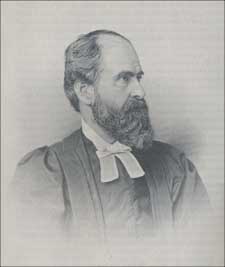 Henry Jackson Van Dyke, Sr., was born in Abington, Pennsylvania, 2 March 1822. He was educated at the University of Pennsylvania, graduating there in 1843 and later graduating from Princeton Theological Seminary in 1846. He was ordained by the Third Presbytery of Philadelphia in June of 1845 and installed as pastor of the Second Presbyterian Church at Bridgeton, New Jersey, where he served from 1845-1852. He was next called to pastor the First Presbyterian Church of Germantown, PA, but only served there briefly, 1852-1853. His his final and longest pastorate was at the First Presbyterian Church (Later renamed the Second Presbyterian Church, following a merger) of Brooklyn, New York, 1853-1891. He died in Brooklyn on 25 May 1891. Honors conferred during his life included the Doctor of Divinity degree, awarded by Westminster College of Fulton, Missouri, 1865. In 1876, he served as Moderator of the 88th General Assembly of the PCUSA, as it met in Brooklyn, NY, just seven years after the reunion of the Old School and New School divisions of that denomination. Rev. Van Dyke was survived by his wife, Henrietta Ashmead Van Dyke [1820-1893]. Their marriage produced two sons, Henry Jackson Van Dyke, Jr. [1852-1933], who later became a noted author and poet; and Paul Van Dyke [1859-1933]. Paul was a Presbyterian minister at Geneva, NY, 1887–89, and then taught church history at Princeton Theological Seminary, 1889–92.
Henry Jackson Van Dyke, Sr., was born in Abington, Pennsylvania, 2 March 1822. He was educated at the University of Pennsylvania, graduating there in 1843 and later graduating from Princeton Theological Seminary in 1846. He was ordained by the Third Presbytery of Philadelphia in June of 1845 and installed as pastor of the Second Presbyterian Church at Bridgeton, New Jersey, where he served from 1845-1852. He was next called to pastor the First Presbyterian Church of Germantown, PA, but only served there briefly, 1852-1853. His his final and longest pastorate was at the First Presbyterian Church (Later renamed the Second Presbyterian Church, following a merger) of Brooklyn, New York, 1853-1891. He died in Brooklyn on 25 May 1891. Honors conferred during his life included the Doctor of Divinity degree, awarded by Westminster College of Fulton, Missouri, 1865. In 1876, he served as Moderator of the 88th General Assembly of the PCUSA, as it met in Brooklyn, NY, just seven years after the reunion of the Old School and New School divisions of that denomination. Rev. Van Dyke was survived by his wife, Henrietta Ashmead Van Dyke [1820-1893]. Their marriage produced two sons, Henry Jackson Van Dyke, Jr. [1852-1933], who later became a noted author and poet; and Paul Van Dyke [1859-1933]. Paul was a Presbyterian minister at Geneva, NY, 1887–89, and then taught church history at Princeton Theological Seminary, 1889–92.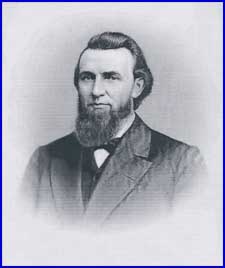 By all means then you must also read the review written by James Renwick Willson Sloane [1823-1886], a Reformed Presbyterian pastor and contemporary of Rev. Van Dyke. See the link below, or again, visit the page listing Rev. Sloane’s works, at the Log College Press.
By all means then you must also read the review written by James Renwick Willson Sloane [1823-1886], a Reformed Presbyterian pastor and contemporary of Rev. Van Dyke. See the link below, or again, visit the page listing Rev. Sloane’s works, at the Log College Press.
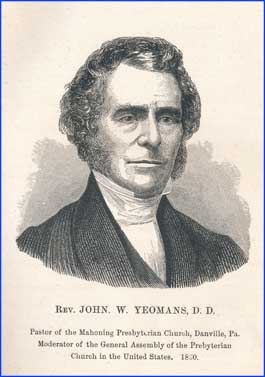 It was on this day, August 18th, in 1841, that an
It was on this day, August 18th, in 1841, that an 